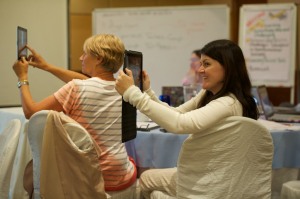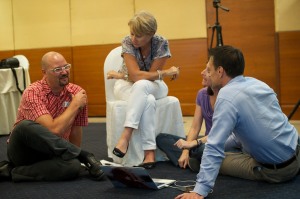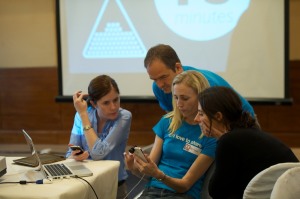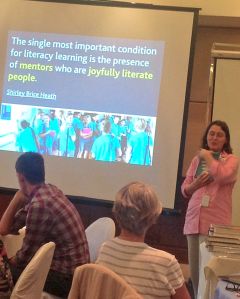I was lucky enough to participate in a 3-day retreat with 25 teachers from across UWCSEA’s two campuses, designed to build capacity in the college with regards to coaching and mentoring in general, and technology in particular. We have had a lot of requests for more details about the retreat, so I thought I’d outline some key aspects:
Approach
The planning committee comprised of the Digital Literacy Coaches, Teacher Librarians & our Tech Director. Andrew McCarthy (DLC at Dover) created a wonderful Google site for the retreat, then we divided into groups to plan and populate the site according to interest/level of expertise.
The retreat focused on Cognitive Coaching and Mentoring (facilitated by the dynamic duo of William Powell & Ochan Kusuma-Powell) in the morning sessions, together with afternoon sessions exploring strategic technology themes at UWCSEA. We wanted to build in a culture of sharing and team building throughout. To this end, we incorporated an optional Photo Walk with Dave Caleb (Grade Four teacher and photographer extraordinaire), time for sharing best practice from participants and a social dinner one evening.
Surfacing assumptions about adult learning — preconceived notions vs. what the research suggests
Four support functions: Coaching, Consulting, Collaborating, and Evaluating
Trust and Rapport
Thursday – 8am to 12pm
Self-Directed Learning: how does a Mentor support it
Coaching as Mentoring
The Planning Conversation – how to support a Mentee in planning
Practice with specific coaching strategies
Friday – 8am to 12pm
Situational Leadership for Adult Learning: Directive and Supportive Behaviors
Feedback: The Breakfast of Champions and Losers — how different types of feedback affect the recipient.
Kegan’s Stages of Adult Development and how they impact learning.
The Reflecting Conversation: how to support a Mentee in reflecting and evaluating technology use.
Things I learned:
If you effectively double the number of devices people have access to, you will break the wifi
 One exciting aspect of the conference was that we were able to give each Tech Mentor a new iPad. There were several reasons for this, including the fact that teachers who play with technology in their everyday lives are more likely to use it in the classroom (and beyond), as well as the opportunities for meaningful and detailed assessment for learning that the iPad affords. Not surprisingly, the iPads were very well-received by the Mentors, and they dove headfirst into exploring it for note taking, capturing images, creating iMovie trailers and much more.
One exciting aspect of the conference was that we were able to give each Tech Mentor a new iPad. There were several reasons for this, including the fact that teachers who play with technology in their everyday lives are more likely to use it in the classroom (and beyond), as well as the opportunities for meaningful and detailed assessment for learning that the iPad affords. Not surprisingly, the iPads were very well-received by the Mentors, and they dove headfirst into exploring it for note taking, capturing images, creating iMovie trailers and much more.
The downside to that is that although we factored in the number of people coming to the Retreat, we didn’t take the number of devices they would be connecting to the wifi into consideration. Lesson learned.
People Really Matter
 From the feedback we received, the chance to meet and get to know people from the other campuses repeatedly came up. Both our campuses are HUGE, and it is not unusual that people can work at the same campus for years and not lay eyes on one another. Just taking the time to sit down and really learn about some other people was a considerable benefit. We know that magical things happen when you put passionate and interesting people in the same room together, and the Tech Mentors’ Retreat certainly confirmed that.
From the feedback we received, the chance to meet and get to know people from the other campuses repeatedly came up. Both our campuses are HUGE, and it is not unusual that people can work at the same campus for years and not lay eyes on one another. Just taking the time to sit down and really learn about some other people was a considerable benefit. We know that magical things happen when you put passionate and interesting people in the same room together, and the Tech Mentors’ Retreat certainly confirmed that.
Pedagogy First, Technology Second
 This Retreat was not designed to teach the teachers a whole lot of technology. The people who were there were already keen on the tech – we didn’t need to shove it down their throats. What made it so successful in my mind was that it was grounded in research and emphasized technology as a tool for learning, rather than an end in itself. In fact the majority of the conference involved best practice for interacting with others – social skills 101 if you like – and would be useful for any individual! It gave a lot of insights into the reasons people can be reluctant to use technology, and provided some techniques to deal with these sort of issues at school.
This Retreat was not designed to teach the teachers a whole lot of technology. The people who were there were already keen on the tech – we didn’t need to shove it down their throats. What made it so successful in my mind was that it was grounded in research and emphasized technology as a tool for learning, rather than an end in itself. In fact the majority of the conference involved best practice for interacting with others – social skills 101 if you like – and would be useful for any individual! It gave a lot of insights into the reasons people can be reluctant to use technology, and provided some techniques to deal with these sort of issues at school.
I Still Love to Share
And so it seems did our Mentors. It was neat to have the showcase sessions with interesting things people are doing in their classrooms. Learning from the experience in the room made people feel valued, and reminded us that there are so many wonderful things happening already at our school, we just need to provide opportunities for people to share with a wider audience.
[Please check out our Storify collections from Day 1, Day 2 & Day 3 if you would like to see the collective knowledge of the group as we went along.]
Getting off Campus is a Good Thing
A new location can help us to switch our mind from the pulls of day-to-day teaching, to focus on new learning with fewer distractions. It felt like we were at a conference in another country.
Visual Literacy is Important for All
Many Tech Mentors mentioned Noah Katz‘s work on Visual Literacy as a highlight for them. Noah (DLC at Dover) reminded us that we all have a role to play in helping students learn how to share information in the clearest, most visually appealing way possible. We hope to get Noah’s presentation up for you soon, so you can all benefit from his knowledge in this subject.
Passion is Infectious
When we are passionate about something, it really shows through in our presentations. Watching Noah talk about design, Katie Day talk about literacy or Dave Caleb about photography, well, you can’t help but get sucked into that vortex of awesomeness. How are we making this happen for the students we teach? For our teaching colleagues? For ourselves? These are questions worth considering as we look ahead to a new academic year in August.
Thank you!
I couldn’t let the opportunity to say a couple of thank yous go by…
Andrew, thanks for coming up with this genius plan in the first place; and Ben, thanks for having the vision to support it and help make it happen.
To our new Tech Mentors, working with you was an absolute pleasure, and I am grateful so many of you are on Twitter etc so we can keep the conversations going.








